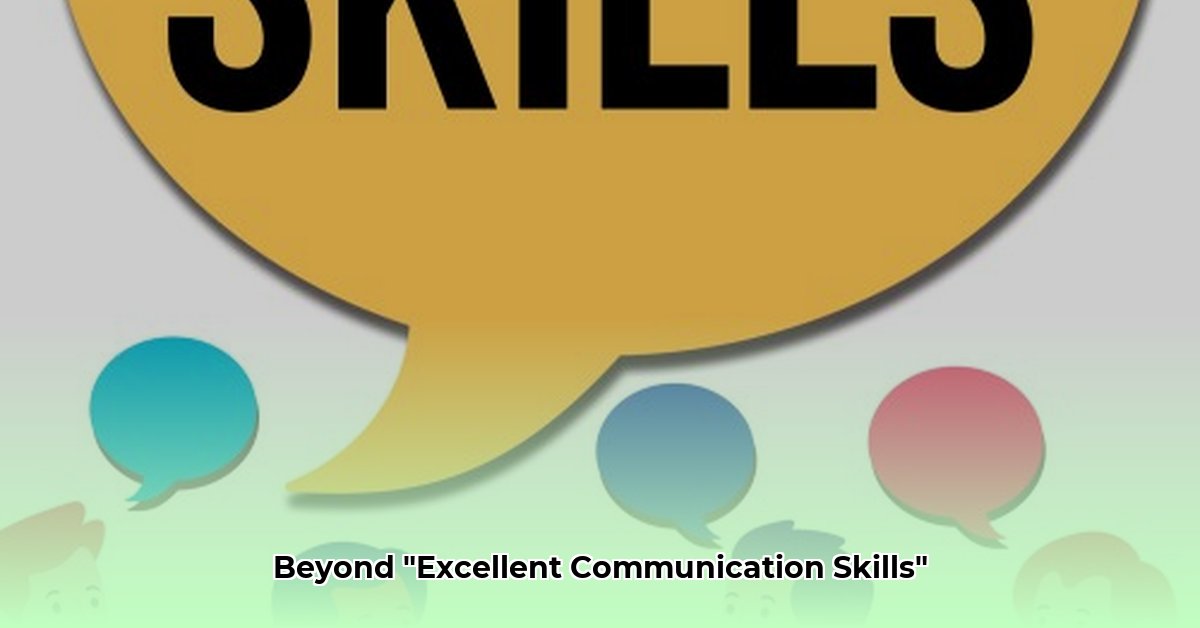Boost Your Resume with Powerful Communication Synonyms
Want your resume and cover letter to stand out? Using generic “communication skills” simply won’t cut it. This guide provides powerful words and phrases to showcase your communication abilities, from writing and speaking to nonverbal cues. Consider it a communication makeover, helping you impress potential employers and become a more effective communicator overall.
Interpersonal Skills: Building Connections
Describing your interpersonal skills requires more than just saying you’re a “people person.” Use specific terms that resonate with your abilities:
- Relationship Building: Excel at forging connections and fostering positive relationships? This term highlights your networking prowess.
- Collaboration: Thrive in team settings and enjoy working towards shared goals? “Collaboration” demonstrates your team-oriented approach.
- Active Listening: Truly listen and respond thoughtfully? Employers value active listeners who absorb information effectively.
- Empathy: Understand others’ perspectives and respond with compassion? Empathy is a powerful asset in any workplace.
- Conflict Resolution: Navigate disagreements and find solutions? Highlight your ability to mediate disputes and build stronger relationships.
- Negotiation: Master the art of compromise and win-win solutions? “Negotiation” is a crucial skill in various fields.
- Interpersonal Skills (with Impact): Even if using “interpersonal skills,” back it up with concrete examples. Instead of “Strong communication skills,” try “Proven ability to build rapport with clients and foster a positive team environment.”
Verbal Communication: Finding Your Voice
Showcase your verbal strengths with descriptive terms beyond “excellent verbal communication”:
- Articulate: Express complex ideas clearly and concisely? “Articulate” demonstrates your command of language.
- Eloquent: Captivate your audience with graceful and precise speech? “Eloquent” suggests sophistication and polish.
- Persuasive: Convince others to see your point of view? “Persuasive” is essential for leadership and sales roles.
- Concise: Value efficiency and get straight to the point? “Concise” shows respect for your audience’s time.
- Clear: Ensure your communication is easily understood, minimizing misinterpretations.
- Presentation Skills: Command attention and deliver impactful presentations? Emphasize your ability to engage an audience.
For example, instead of “Excellent verbal communication skills,” try “Demonstrated ability to deliver compelling presentations with clarity and persuasive rhetoric.”
Written Communication: Mastering the Written Word
In today’s digital age, strong writing is crucial. Replace “excellent writing skills” with more descriptive alternatives:
- Concise: Eliminate unnecessary fluff and get straight to the point.
- Persuasive: Craft compelling arguments and influence readers through your writing?
- Articulate: Express written ideas clearly and effectively.
- Grammatically Sound: Demonstrate attention to detail with polished and professional writing.
- Effective: Ensure your writing achieves its intended purpose, whether it’s to inform, persuade, or entertain.
Instead of “Strong written communication skills,” try “Adept at crafting concise and persuasive marketing materials with grammatically sound prose.”
Nonverbal Communication: Beyond Words
Communication extends beyond words. Highlight your nonverbal skills:
- Body Language: Project confidence and openness through your posture and gestures.
- Eye Contact: Build trust and rapport by maintaining appropriate eye contact.
- Active Listening (Nonverbal Cues): Show engagement through nonverbal cues like nodding and leaning in.
For example, write “Demonstrates strong nonverbal communication skills through engaging body language and attentive listening cues.”
Communication Skills in Action: A Summary
| Skill Category | Generic Phrase | Powerful Alternative |
|---|---|---|
| Interpersonal | Good communication skills | Builds rapport, navigates team dynamics, fosters positive relationships |
| Verbal | Excellent verbal communication | Articulate and persuasive communicator; adept at presentations |
| Written | Strong written communication skills | Crafts clear, concise, and impactful written materials |
| Nonverbal | Excellent nonverbal communication | Projects professionalism through engaging body language and attentive listening |
Tailor your language to the specific job and highlight the most relevant skills.
Show, Don’t Just Tell: Demonstrating Communication Skills
It’s not enough to claim strong communication skills; you need to demonstrate them. Provide tangible evidence and specific examples. Quantify your accomplishments whenever possible. Instead of “excellent written communication skills,” try “crafted marketing materials that boosted website traffic by 20%.”
Why “Communication Skills” Falls Short
“Communication skills” is overused and generic. Go beyond this cliché by using vibrant, action-packed language that captures attention.
Tailoring Your Language to the Job
Just as you wouldn’t wear a swimsuit to a board meeting, tailor your communication buzzwords to each job application. A marketing role requires different vocabulary than a technical writing position.
Action Word Arsenal
| Communication Skill Category | Powerful Synonyms | Resume/Cover Letter Example |
|---|---|---|
| Verbal | Articulate, persuasive, eloquent, concise, diplomatic, negotiate, mediate, clarify | “Negotiated contracts with key clients, resulting in a 15% revenue increase.” |
| Written | Compelling, concise, persuasive, insightful, synthesize, summarize, edit, draft | “Synthesized complex research into concise reports for executive leadership.” |
| Interpersonal | Collaborative, empathetic, diplomatic, tactful, facilitate, build consensus, mentor | “Facilitated team meetings that fostered open communication, reducing project delays by 20%.” |
| Presentation | Engaging, dynamic, captivating, informative, visualize, synthesize, present, explain | “Presented data visualizations to stakeholders, driving data-informed decisions.” |
Weave these words into your narrative, showcasing your communication portfolio. What projects or accomplishments best demonstrate your abilities?
Research suggests the future of workplace communication will emphasize emotional intelligence and cross-cultural communication. Stay updated on the latest trends.
The Power of Precise Language
Strong synonyms transform generic statements into compelling narratives. They elevate the perceived value of your contributions. For example, instead of “wrote reports,” use more impactful verbs:
| Word Choice | Impact | Example |
|---|---|---|
| Crafted | Careful attention to detail | Crafted compelling narratives for quarterly reports, boosting stakeholder engagement by 15%. |
| Synthesized | Analytical thinking | Synthesized complex data into easy-to-understand executive summaries. |
| Authored | Ownership and authority | Authored persuasive proposals that secured $500,000 in new funding. |
| Developed | Creative process | Developed engaging content that increased website traffic by 20%. |
| Formulated | Strategic thinking | Formulated clear communication strategies for crisis management. |
Precise terms for verbal communication paint a more dynamic picture:
- Collaborated: Partnership and teamwork.
- Negotiated: Reaching agreements.
- Presented: Confidence and public speaking.
- Mediated: Conflict resolution.
- Facilitated: Guiding conversations.
Showcase teamwork and collaboration by using verbs like:
- Coordinated: Organizational skills.
- Cooperated: Willingness to work together.
- Liaised: Bridging communication between groups.
Specificity and demonstrable impact are key. Tailor your resume to each application. Ongoing research suggests this personalized approach improves your interview chances.
Elevate Your Language with Power Words
Power words transform your resume and cover letter from adequate to amazing. They showcase your skills in a way that resonates with employers. Choosing the right word involves understanding nuances. “Orchestrated” instead of “managed” implies skillful coordination. “Facilitated” instead of “helped” suggests a more proactive contribution.
Applicant Tracking Systems (ATS) scan for keywords. While some experts believe focusing solely on keywords creates a robotic tone, incorporating relevant terms is important. Ongoing research explores ATS algorithms and their ability to discern context. Balance optimized keywords with engaging writing.
Here’s an expanded table of power synonyms:
| Communication Type | Power Synonyms | Example |
|---|---|---|
| Verbal | Articulate, Persuasive, Engaging, Dynamic, Confident, Eloquent, Captivating | Captivated audiences with dynamic presentations on complex technical subjects. |
| Written | Concise, Compelling, Insightful, Articulate, Meticulous, Persuasive, Cogent | Crafted concise and persuasive proposals that secured $1 million in funding. |
| Interpersonal | Collaborative, Diplomatic, Adaptable, Empathetic, Tactful, Perceptive, Astute | Diplomatically navigated sensitive negotiations, achieving a mutually beneficial agreement. |
| Leadership | Visionary, Strategic, Influential, Decisive, Motivational, Transformative, Inspiring | Inspired teams to achieve record-breaking performance through clear communication. |
| Technical | Analytical, Methodical, Detail-oriented, Precise, Concise, Explicit, Systematic | Systematically documented complex processes, improving efficiency by 15%. |
| Creative | Imaginative, Innovative, Visionary, Artistic, Expressive, Original, Intuitive | Developed original marketing campaigns that increased brand awareness by 25%. |
Context is key. Tailor language to the specific job description and industry. Quantify achievements whenever possible. “Increased customer satisfaction scores by 15%” is more impactful than simply stating you improved customer satisfaction.
Power words can connect the dots and highlight your value. They transform duties into a dynamic showcase of accomplishments.
Actionable Strategies for Using Power Words
Using power words effectively involves strategy.
Verbs: Use action verbs like “launch,” “initiate,” or “catalyze” instead of “start.” Replace “improve” with “enhance,” “optimize,” or “revolutionize.”
Adjectives: Use descriptive adjectives like “exceptional,” “remarkable,” or “stellar” instead of “good.” Replace “important” with “critical,” “essential,” or “vital.”
Strategic Phrases: Use phrases like “Let me put it this way,” “To clarify,” or “The key takeaway here is…” to guide the conversation.
Small Words, Big Impact: Don’t underestimate simple words like “because,” “imagine,” and “guaranteed.”
Power Words in Practice:
- Know Your Audience: Tailor word choices to your audience (executives, colleagues, customers).
-
Context is Key: Consider the setting and tone. “Groundbreaking” might not suit a casual email.
-
Less is More: Avoid overusing power words; they can sound insincere.
-
Test and Refine: Experiment and observe audience reactions. Refine your approach based on results.
Example: Instead of “This software is good because it will help us do things faster,” try, “This innovative software will empower us to streamline our workflow and dramatically increase our efficiency.”
Cautions: While effective, overuse can make your writing sound forced. Current research suggests balancing impactful language with sincerity. Ongoing research on power words will likely evolve our understanding of their impact. Apply these strategies thoughtfully to enhance your communication and achieve your goals.
- Best Mindfulness Books for Anxiety, Sleep, and Daily Peace - January 29, 2026
- Books On Mindfulness For A Happier, More Present Life - January 28, 2026
- Essential Meditation Books for Beginners and Experienced Practitioners - January 27, 2026
















